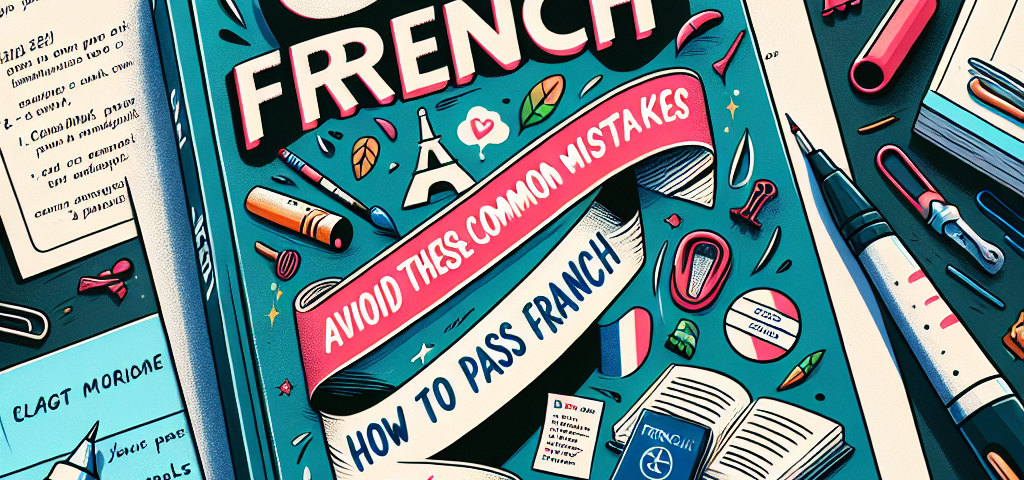
Speak Like a Local: Immersive Techniques for French Conversation Practice
May 30, 2025
Fluency Awaits: The Best Resources to Learn French Effectively
May 30, 2025
The GCSE French exam can be a daunting task for many students. With a broad range of topics and skills to master, it’s easy to overlook certain aspects of your preparation. To help you navigate this challenge and achieve a passing grade, we’ve compiled a list of common mistakes students make and how to avoid them.
1. Neglecting Vocabulary
The Mistake:
Many students underestimate the importance of vocabulary. They may focus on grammar and sentence structure while neglecting to learn the essential words and phrases needed for comprehension and conversation.
How to Avoid It:
- Regular Practice: Dedicate time every day to learn new words. Flashcards, vocabulary apps, or word lists are effective tools.
- Themed Lists: Focus on vocabulary by theme—food, travel, family, hobbies, etc. This helps in contextual learning.
- Active Usage: Incorporate new vocabulary into your speaking and writing exercises to solidify your knowledge.
2. Overlooking Grammar Rules
The Mistake:
Grammar is the backbone of any language, yet some students skip over these rules, thinking they can rely solely on speaking or writing practice.
How to Avoid It:
- Understand the Basics: Ensure you understand essential grammar points, such as verb conjugations, noun-adjective agreement, and the use of articles.
- Practice Exercises: Incorporate grammar exercises into your study routine. Websites and textbooks provide drills to strengthen your understanding.
- Seek Help: If certain concepts are unclear, don’t hesitate to ask your teacher or peers for clarification.
3. Failing to Practice Speaking
The Mistake:
Some students are so focused on reading and writing that they neglect to practice speaking, which is a crucial part of the exam.
How to Avoid It:
- Language Partners: Find a study buddy to practice conversation. It can help build confidence and fluency.
- Online Resources: Use language exchange platforms or apps to connect with native French speakers.
- Recording Yourself: Record your spoken French to identify areas needing improvement in pronunciation and fluency.
4. Ignoring Listening Skills
The Mistake:
Listening comprehension is often an overlooked area of focus. Students may not practice listening until they are faced with the audio portion of the exam.
How to Avoid It:
- Engage with French Media: Listen to French music, podcasts, or watch French films and TV shows. This exposes you to various accents and speaking styles.
- Practice with Past Papers: Use past exam papers that include listening sections to get used to the format and type of questions you will face.
5. Inconsistent Practice
The Mistake:
Last-minute cramming or sporadic studying can lead to inconsistencies in language retention and proficiency.
How to Avoid It:
- Study Schedule: Develop a consistent study schedule that allocates time for vocabulary, grammar, speaking, and listening.
- Set Goals: Create achievable goals for each study session to keep you motivated and on track.
- Regular Review: Make sure to regularly review previous material to reinforce your learning.
6. Not Engaging with the Culture
The Mistake:
Some students focus strictly on the language without engaging with French culture, which can enhance understanding and retention.
How to Avoid It:
- Cultural Immersion: Explore French culture through food, music, literature, and art. This not only enriches your language experience but also makes learning more enjoyable.
- Culinary Exploration: Try cooking French recipes while learning culinary vocabulary.
- Cultural Events: Attend French cultural events or language cafes in your area.
Conclusion
Passing GCSE French requires commitment, consistency, and a strategic approach. By avoiding these common mistakes and incorporating targeted practices into your study routine, you can enhance your language skills and increase your chances of success. Remember, practice makes perfect. Engage actively with the language, seek help when needed, and most importantly, enjoy the process of learning a new language! Bonne chance!

